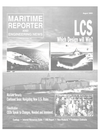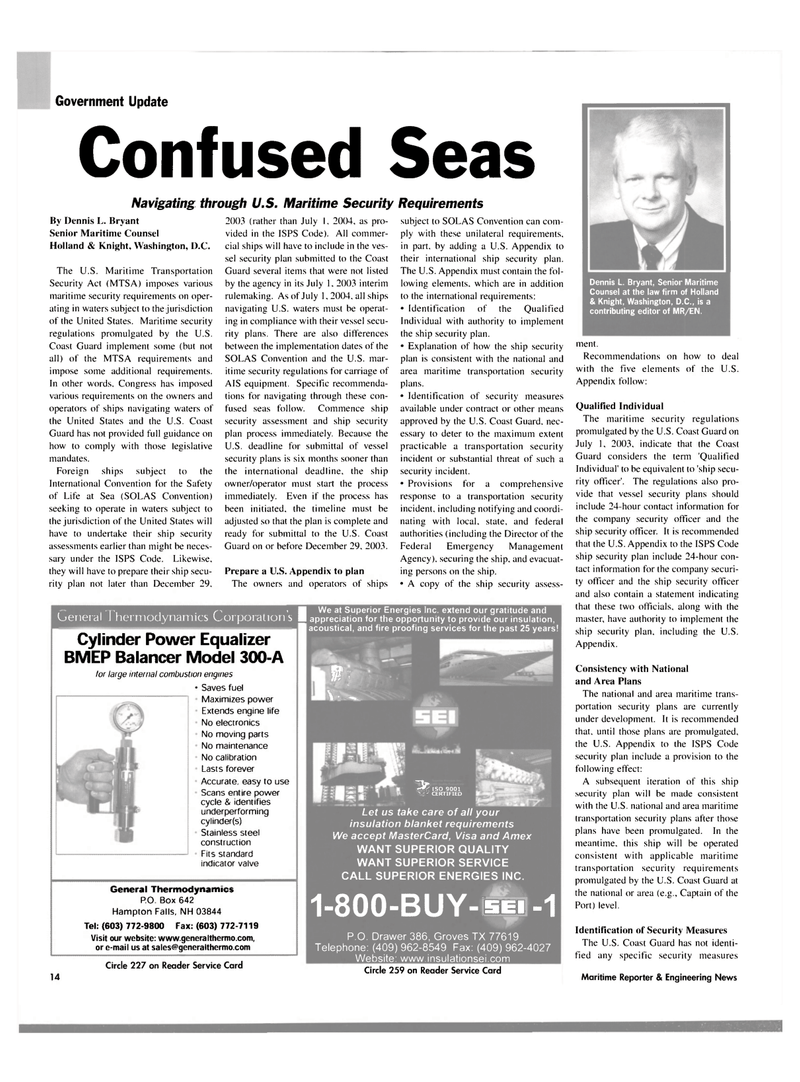
Page 14: of Maritime Reporter Magazine (August 2003)
Read this page in Pdf, Flash or Html5 edition of August 2003 Maritime Reporter Magazine
Government Update
Confused Seas
Navigating through U.S. Maritime Security Requirements
By Dennis L. Bryant
Senior Maritime Counsel
Holland & Knight, Washington, D.C.
The U.S. Maritime Transportation
Security Act (MTSA) imposes various maritime security requirements on oper- ating in waters subject to the jurisdiction of the United States. Maritime security regulations promulgated by the U.S.
Coast Guard implement some (but not all) of the MTSA requirements and impose some additional requirements.
In other words. Congress has imposed various requirements on the owners and operators of ships navigating waters of the United States and the U.S. Coast
Guard has not provided full guidance on how to comply with those legislative mandates.
Foreign ships subject to the
International Convention for the Safety of Life at Sea (SOLAS Convention) seeking to operate in waters subject to the jurisdiction of the United States will have to undertake their ship security assessments earlier than might be neces- sary under the ISPS Code. Likewise, they will have to prepare their ship secu- rity plan not later than December 29, 2003 (rather than July I. 2004, as pro- vided in the ISPS Code). All commer- cial ships will have to include in the ves- sel security plan submitted to the Coast
Guard several items that were not listed by the agency in its July 1, 2003 interim rulemaking. As of July 1, 2004. all ships navigating U.S. waters must be operat- ing in compliance with their vessel secu- rity plans. There are also differences between the implementation dates of the
SOLAS Convention and the U.S. mar- itime security regulations for carriage of
AIS equipment. Specific recommenda- tions for navigating through these con- fused seas follow. Commence ship security assessment and ship security plan process immediately. Because the
U.S. deadline for submittal of vessel security plans is six months sooner than the international deadline, the ship owner/operator must start the process immediately. Even if the process has been initiated, the timeline must be adjusted so that the plan is complete and ready for submittal to the U.S. Coast
Guard on or before December 29. 2003.
Prepare a U.S. Appendix to plan
The owners and operators of ships subject to SOLAS Convention can com- ply with these unilateral requirements, in part, by adding a U.S. Appendix to their international ship security plan.
The U.S. Appendix must contain the fol- lowing elements, which are in addition to the international requirements: • Identification of the Qualified
Individual with authority to implement the ship security plan. • Explanation of how the ship security plan is consistent with the national and area maritime transportation security plans. • Identification of security measures available under contract or other means approved by the U.S. Coast Guard, nec- essary to deter to the maximum extent practicable a transportation security incident or substantial threat of such a security incident. • Provisions for a comprehensive response to a transportation security incident, including notifying and coordi- nating with local, state, and federal authorities (including the Director of the
Federal Emergency Management
Agency), securing the ship, and evacuat- ing persons on the ship. • A copy of the ship security assess- , t, , r^ ' I We at Superior Energies Inc. extend our gratitude and General i hermodynamics Corporations • appreciation for the opportunity to provide our insulation,
Cylinder Power Equalizer
BMEP Balancer Model 300-A lor large internal combustion engines • Saves fuel
Maximizes power
Extends engine life
No electronics
No moving parts
No maintenance
No calibration
Lasts forever
Accurate, easy to use
Scans entire power cycle & identifies underperforming cylinder(s)
Stainless steel construction
Fits standard indicator valve
General Thermodynamics
P.O. Box 642
Hampton Falls, NH 03844
Tel: (603) 772-9800 Fax: (603) 772-7119
Visit our website: www.generalthermo.com, or e-mail us at [email protected] acoustical, and fire proofing services for the past 25 years! t r \ V
Ifc.SO 9001
Xs^ CERTIFIED
Circle 227 on Reader Service Card 14
Let us take care of all your insulation blanket requirements
We accept MasterCard, Visa and Amex
WANT SUPERIOR QUALITY
WANT SUPERIOR SERVICE
CALL SUPERIOR ENERGIES INC. 1-800-BUY HI- 1
P.O. Drawer 386, Groves TX 77619
Telephone: (409) 962-8549 Fax: (409) 962-4027
Website: www.insulationsei.com
Circle 259 on Reader Service Card
Dennis L. Bryant, Senior Maritime
Counsel at the law firm of Holland & Knight, Washington, D.C., is a contributing editor of MR/EN. ment.
Recommendations on how to deal with the five elements of the U.S.
Appendix follow:
Qualified Individual
The maritime security regulations promulgated by the U.S. Coast Guard on
July 1, 2003, indicate that the Coast
Guard considers the term 'Qualified
Individual' to be equivalent to 'ship secu- rity officer'. The regulations also pro- vide that vessel security plans should include 24-hour contact information for the company security officer and the ship security officer. It is recommended that the U.S. Appendix to the ISPS Code ship security plan include 24-hour con- tact information for the company securi- ty officer and the ship security officer and also contain a statement indicating that these two officials, along with the master, have authority to implement (he ship security plan, including the U.S.
Appendix.
Consistency with National and Area Plans
The national and area maritime trans- portation security plans are currently under development. It is recommended that, until those plans are promulgated, the U.S. Appendix to the ISPS Code security plan include a provision to the following effect:
A subsequent iteration of this ship security plan will be made consistent with the U.S. national and area maritime transportation security plans after those plans have been promulgated. In the meantime, this ship will be operated consistent with applicable maritime transportation security requirements promulgated by the U.S. Coast Guard at the national or area (e.g., Captain of the
Port) level.
Identification of Security Measures
The U.S. Coast Guard has not identi- fied any specific security measures
Maritime Reporter & Engineering News

 13
13

 15
15
